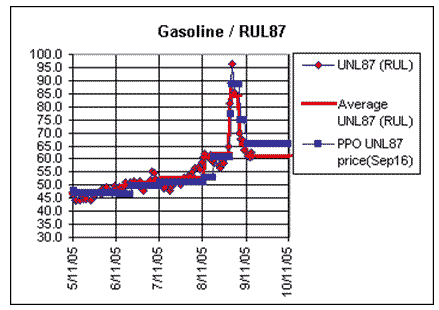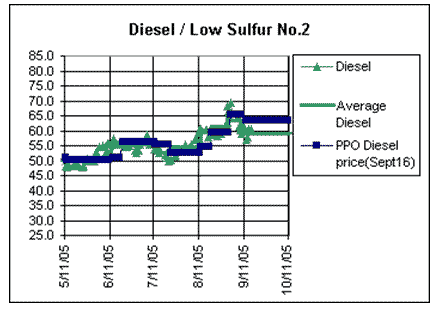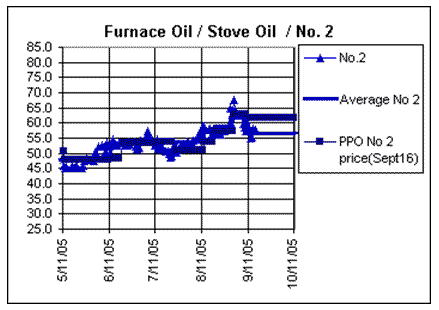NLIS 1
September 20, 2005
(Government Services)
The following is being distributed at the
request of the Public Utilities Board�s Petroleum Pricing Office (PPO):
Further reductions for gasoline,
diesel and furnace/stove oil prices
Effective 12:01 a.m. Tuesday, September 20, the
Public Utilities Board�s Petroleum Pricing Office (PPO) will reduce the maximum
allowable prices for most regulated fuels in Newfoundland and Labrador (NL).
The maximum price for all types of gasoline will decrease by 6.5 cents per litre
(cpl), making this the third decrease in as many weeks. Distillate fuels will
also see declining maximum prices: diesel by 5.4 or 5.5 cpl (depending on the
HST rounding effect for a particular pricing zone) and furnace/stove oil by 5.31
cpl.
There will be no change in the maximum price for residential propane used for
home heating purposes.
Following the recent period of extraordinary pricing volatility for petroleum
products, which saw the Public Utilities Board respond to these global
conditions by taking actions outside its established pricing practices, the
board has now returned to its more normal pricing cycle. This resulted in the
normal September 15 price adjustment for all fuels (except gasoline, which was
adjusted early on September 13) and now the application of the interruption
formula to reflect a further decline in prices as the markets adjust to changes
since Hurricane Katrina.
David Toms, PPO director (acting), indicated: �There remains significant
uncertainty in the global markets over the ongoing balance between supply and
demand, particularly as it relates to the current tight situation regarding
refinery capacity. With respect to future pricing adjustments, the board will
continue to monitor the markets for refined petroleum products on a daily basis
and take whatever actions are necessary to address fairly the needs of all
stakeholders in NL markets.�
MARKETS
One of the many factors that have recently
decreased refined fuel prices following the fallout from Hurricane Katrina,
which shut down many refineries and damaged oil production, is the sign that
high fuel prices may be slowing global demand growth.
OPEC (Organization of Petroleum Exporting Countries), International Energy
Agency (IEA) and the U.S. Energy Information Administration (EIA) have all cut
their forecasts for demand estimates in light of recent fuel-price hikes and
reduced global economic growth. As well, news from the EIA weekly inventory
report released September 14 shows gasoline demand, in particular, had declined
assisting in the lowering of these market fuel prices.
Also influencing the commodities market was the commitment from the IEA, the
U.S. Strategic Petroleum Reserves, and possibly OPEC, to increasing the
availability of oil in order to make petroleum products; however, fears of fuel
shortages have not disappeared as refineries (nearly 20 per cent of U.S.
refining capacity was affected by the latest hurricane) are taking longer than
expected to get back into full production.
BACKGROUNDER
PPO benchmarks are established based on the
average prices of refined products in the
period since the last time maximum prices were established. The PPO regularly
sets maximum fuel prices on the 15th of each month.
For the interruption formula to be used on gasoline and distillate fuels, the
PPO requires the average of market prices to be 3.5 cpl greater or less than the
current PPO benchmark prices (except propane, which requires +/- 5.0 cpl) over
five market business days. The formula is not used for five market days after
new prices are set under regulation, or if it interferes with the impending
price change made each month.
Illustrated in the following graphs is the market-price performance for fuels
regulated by the board for recent pricing periods up to September 16:



1. Automotive Fuels � Maximum Retail Pump Prices � Effective September 20, 2005
2. Heating Fuels � Maximum Tank Wagon (or ** Tank Farm) Prices � Effective
September 20, 2005
Media contact: Michelle Hicks, Communications, 1-866-489-8800, (709) 489-8837
2005 09 20
10:00 a.m.
|







